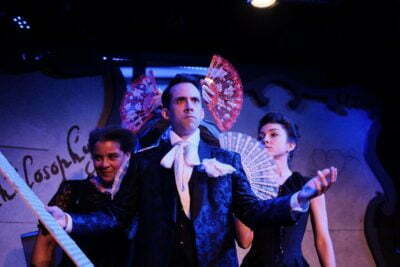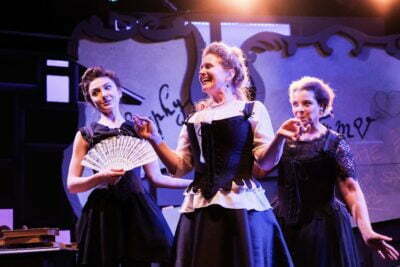Emilie: La Marquise Du Châtelet Defends Her Life Tonight
By Lauren Gunderson
Directed by Bryan Wakefield
Produced by Organic Theater Company
Playing at The Greenhouse Theater Center, Chicago
The Play In Which Everything Is Narrated and Nothing Is Entertaining
A few years ago I was cast in a play about the life of Emilie Du Châtelet. I played a butler (who had a thing for the maid) as well as some fellow named Longchamps. I mention this infinitesimal blip in my fledgling acting resume not only to highlight the current interest in this unrecognized figure in the history of science, but also to remark on a curious similarity between the plays: in dramatizing a story on the life of Emilie—a woman whose achievements both plays tacitly claim were eclipsed by her gender and her intimate proximity to Voltaire’s ego—both plays fall into similar traps of conceiving her story in much too broad of terms, as well as (ironically) writing Voltaire as the most interesting and emotionally complex character in the story. Though I’d say this play is better and by contrast more focused, despite whatever historical value it may hold it still fails to hold the interest.

In Emilie, Emilie (Laura Sturm) is mysteriously and inexplicably brought back from death to a kind of spiritual consciousness. What’s she doing back, you ask? Apparently to tell the story of her career, which turns out to be less a defense of her life than a simple narration.
In direct-address to the audience, Emilie introduces the notable figures in her life, narrates some events, and introduces other events as scenes in which she and the others act out the “drama.” “Drama” gets scare-quotes here because what drama there is often gets choked by the narrative framing. Apart from a few surprising scenes of real emotional vehemence, the scenes of drama that pop up mostly come across as simple banter or conversations between characters who feel more like ideas of historical figures than real humans: in other words, they have no psychological depth.
Apart from the difficulty of trying to raise and humanize the 18th century, much of the cumbersome, cardboard feel of the character interactions I think is a product of relying on the narration to communicate the history of these relationships: everyone is introduced, the story is narrated episodically, and then the dramatic scenes are so compacted and formalized that they feel stiff, quick and determined, as though the play were progressing along the steel rails of a locomotive.

Then there’s Voltaire (Joel Moses). Perhaps Voltaire ought be represented by a black shadow, since it seems any living, visual representation of the man is incapable of resisting the spotlight—even from the dead. In the play, we see that Voltaire is not only Emilie’s greatest advocate, but he is also her greatest foil. Apart from their love affair—whose ravenous physicality is portrayed vicariously by the young Emilie, Sara Copeland, who often must jog onstage just for a rapturous kiss—Emilie and Voltaire work together and share ideas.
The first sign of Voltaire’s jealousy is when he ignores Emilie’s corrections to his science paper, and then acts spurned when her own paper on the same subject is recognized. Later, he discourages Emilie from pursuing her study of force vive—basically the scientific debate at the time as to whether F=mv ought to be squared or not (a pretty big deal with physical and metaphysical implications). Nevertheless, until her untimely death after a late birth, Voltaire is shown as remaining smitten and dedicated to Emilie and her work.
The majority of the stage time is dedicated to this relationship. As Emilie’s “historical relevance” rests on her contributions to science, and as these complex contributions can at best only be addressed indirectly—such as “The scene in which Emilie writes a book,” which thankfully takes place during intermission—it makes sense that this would be the case, particularly since Voltaire seems to have been involved in her life throughout the significant portions of her career.

But what is the defense Emilie is giving? I didn’t get that. In fact, I felt the story depicted more a defense of Voltaire’s involvement than of Emilie’s life. And what is Emilie’s life? Her estranged relationship with her husband, her long-term affair with Voltaire, her scientific accomplishments and pursuits, her late affair with poet? Yes, and more—but what was missing for me was Emilie’s world, in which her life has its being.
The world of France, the world of the court, the world of letters—all these come in and out of focus throughout the play but they never remain, they never stand there, erected and open, for us to appreciate Emilie in her world. Instead, we are treated to a kind of historical reenactment that, yes, gives us information on how things might have been, but never lets us just see it—existent and living—happening. Emilie’s narration is the author’s distracting hand moving pieces in and out of view: I still don’t know Emilie; I only know what we think of her.
Emilie is a production that will interest audiences already interested in hearing about women whom history has disenfranchised. Yet, many, if not all, of the details touched upon in this play can be found summarized on Wikipedia. Besides these details, I don’t see this production offering much else in terms of interest. It certainly wasn’t entertaining.
Fortunately, Organic Theater Company runs productions in repertory and their other current production, King Ubu, is much more entertaining and engaging. So, I’d put my money on the patriarch tonight.
Not Recommended
August Lysy
Playing at The Greenhouse Theater Center Downstairs Studio, 2257 N Lincoln Ave., Chicago. Tickets are $25, with $21 tickets for Students and Seniors. Performances are Wednesdays thru Saturdays at 8:00 p.m., and Sundays at 3:00 p.m. through July 16th. Running time is 105 minutes with one intermission.

